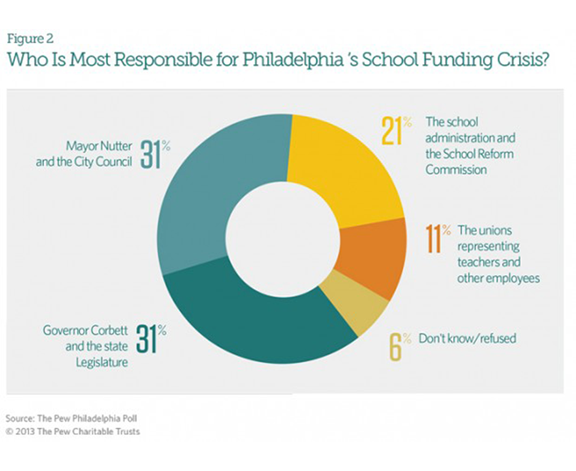By Daniel Denvir
Originally Published at City Paper.
September 17, 2013
Gov. Tom Corbett, Mayor Michael Nutter, the School Reform Commission, and myriad self-described education reform groups have all cited the School District of Philadelphia’s catastrophic budget crisis to demand major concessions from teachers and other workers. But Philadelphians don’t blame teachers, according to a new poll from Pew Charitable Trusts.
The poll, released today, found that thirty-one percent of residents blame Corbett and the Republican-controlled state legislature, thirty-one percent blame Nutter and City Council, and twenty-one percent blamed school administrators and the state-controlled SRC.
Just 11-percent blame unions representing teachers and other workers.
The SRC, with Corbett and Nutter’s support, has demanded that the Philadelphia Federation of Teachers, whose contract expired at the beginning of the month, agree to making $103 million in cuts to salaries and healthcare, ending seniority in teacher assignments, and adopting performance-based merit pay (which typically means using standardized test scores). In August, the SRC suspended portions of the Public School Code, allowing the District to bypass union seniority rules in rehiring laid off teachers and to halt seniority-based pay raises.
Corbett is withholding $45 million in federal funds until the PFT agrees to contract concessions, sparking protests from public school advocates but strong backing from a powerful block of self-described reform organizations critical of unions and supportive of charter school growth (the poll did find that residents have an overall positive view of charters).
The PFT has argued that it is misleading and cynical to blame teachers for a problem caused by long-term underfunding and, more recently, the major cuts to education funding imposed by Corbett. Lower pay for teachers working in challenging city schools, who already make far less than many suburban counterparts, could make it all the more difficult to attract and retain the best talent.
Just 1,600 of 3,800 school employees laid off in June have been hired back, and the district has 3,000 fewer staff in all (see The Notebook breakdown here). Schools opened last week to stories of classes with 40 students, one nurse for every 1,500 students,and a single “itinerant guidance counselor” responsible for eight schools and 2,820 students.
What happens next for Philadelphia schools, which 78-percent of residents surveyed described as of “only fair” or “poor” quality, is unclear. But Philadelphians are definitely angry. Just not at teachers.












Leave A Comment